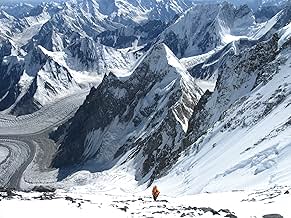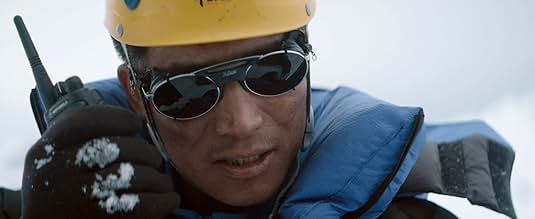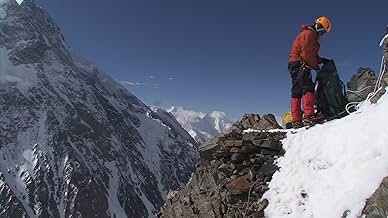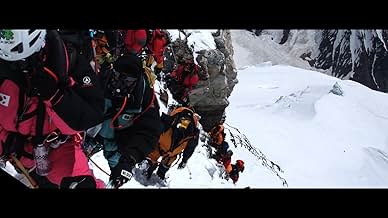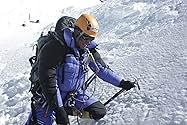IMDb RATING
6.8/10
5.6K
YOUR RATING
The story of the deadliest day on the world's most dangerous mountain, when 11 climbers mysteriously perished on K2.The story of the deadliest day on the world's most dangerous mountain, when 11 climbers mysteriously perished on K2.The story of the deadliest day on the world's most dangerous mountain, when 11 climbers mysteriously perished on K2.
- Awards
- 3 wins & 5 nominations total
Walter Bonatti
- Self
- (archive footage)
Gerard McDonnell
- Self - Climber
- (archive footage)
Hristo Mitzkov
- Marco Confortola
- (as Christo Mitzkov)
Lochlann O'Mearáin
- Ger McDonnell
- (as Lochlainn O'Mearain)
- Director
- Writer
- All cast & crew
- Production, box office & more at IMDbPro
Featured reviews
On August 2008, 11 mountain climbers die on top of the world second highest peak K2. This is a mix of interviews, documentary and recreations to tell the story of the eclectic mix of international teams of climbers. Also it has interviews with Walter Bonatti who is the youngest member of the '54 Italian expedition to summit K2 for the first time.
This is such a compelling true story. The climb and the descend is very tense. The only problem comes with a confused recounting of any controversy in the last 15 minutes. The ending is about a search for what happened to Ger McDonnell. It seems necessary to concentrate much more on him for the whole movie. Since they're doing recreations anyways, it's probably best to just do a narrative story with Ger as the protagonist.
This is such a compelling true story. The climb and the descend is very tense. The only problem comes with a confused recounting of any controversy in the last 15 minutes. The ending is about a search for what happened to Ger McDonnell. It seems necessary to concentrate much more on him for the whole movie. Since they're doing recreations anyways, it's probably best to just do a narrative story with Ger as the protagonist.
"He discovers things about his own body and mind that he had almost forgotten in the day-to-day, year-to-year routine of living." James Ramsey Ullman, High Conquest.
I don't know about you, but if I were approaching the "death zone" while mountain climbing, I'd turn back. However, you can bet the heroes of the documentary, The Summit, hiking the world's second biggest and most difficult mountain (it defeats 1 out of every 4 climbers), K2, had no such thoughts. The Summit won the Sundance World Cinema documentary award this year.
More interesting than the physical exploits is the rationale for doing such a dangerous sport in the first place. Yet, such psychoanalyzing is not a matter for The Summit, a thrilling doc long on the difficult climb and more difficult decisions while fates are decided in sometimes inscrutable and random ways. It's short on the motivation, which pretty much is accepted these days as, "because it's there."
Eleven climbers of 25 lost their lives that day in 2008 without an adequate explanation for any of the deaths. However this thesis is proved once more: Most lives in climbing are lost on the descent. The film has a fragmented, multiple-points-of-view (think of a climbing Rashomon) approach that cuts among the several players and history while featuring a couple of the more charismatic climbers, especially Ger McDonnell, whose death is the most difficult to understand even as he's touted for his alleged attempt to save 3 Korean climbers.
This discursive storytelling can be confusing while it saps the thrust of the inherently intriguing story. The many re-enactments drain the film of its immediate "what-the" doc impact. The film retains some of the awe we all feel when in the presence of such a manifestation of Nature's power:
"You do not laugh when you look at the mountains, or when you look at the sea." Lafcadio Hearn
I don't know about you, but if I were approaching the "death zone" while mountain climbing, I'd turn back. However, you can bet the heroes of the documentary, The Summit, hiking the world's second biggest and most difficult mountain (it defeats 1 out of every 4 climbers), K2, had no such thoughts. The Summit won the Sundance World Cinema documentary award this year.
More interesting than the physical exploits is the rationale for doing such a dangerous sport in the first place. Yet, such psychoanalyzing is not a matter for The Summit, a thrilling doc long on the difficult climb and more difficult decisions while fates are decided in sometimes inscrutable and random ways. It's short on the motivation, which pretty much is accepted these days as, "because it's there."
Eleven climbers of 25 lost their lives that day in 2008 without an adequate explanation for any of the deaths. However this thesis is proved once more: Most lives in climbing are lost on the descent. The film has a fragmented, multiple-points-of-view (think of a climbing Rashomon) approach that cuts among the several players and history while featuring a couple of the more charismatic climbers, especially Ger McDonnell, whose death is the most difficult to understand even as he's touted for his alleged attempt to save 3 Korean climbers.
This discursive storytelling can be confusing while it saps the thrust of the inherently intriguing story. The many re-enactments drain the film of its immediate "what-the" doc impact. The film retains some of the awe we all feel when in the presence of such a manifestation of Nature's power:
"You do not laugh when you look at the mountains, or when you look at the sea." Lafcadio Hearn
This is a story about tragedy caused by complete and utter confusion. From simple mistakes at the beginning of the attempt everything turned into chaos that cost many lives.
So, given that confusion in the subject matter, it would be difficult to remove confusion from the documentary. Sadly, the creators seem to have actually gone out of their way to introduce more confusion. Out of sequence histories, introducing another (related) story, and not attempting to tie everything together.
I'm glad that I watched this movie, I just would have liked it to be better put together.
So, given that confusion in the subject matter, it would be difficult to remove confusion from the documentary. Sadly, the creators seem to have actually gone out of their way to introduce more confusion. Out of sequence histories, introducing another (related) story, and not attempting to tie everything together.
I'm glad that I watched this movie, I just would have liked it to be better put together.
High-altitude mountaineering fascinates many people, this reviewer included, for the extreme demands it places on sportsmen engaged on the sport. They go to places where helicopters don't go, where no human could live for extended periods of time. Different than other extreme nature sports like rafting, cross-country skiing or long-distance trekking, mountaineering provides the only way for people to reach places that are higher above the rest of the World.
In this context, I generally like documentaries and docudramas that focus on various aspects of the sport, its challenges and also its tragedies.
However, The Summit covers a nice story on a confusing and haphazard edition. It combines real-time footage of events, 'debriefing'-style post-fact interviews and dramatization of events are accounted by those that survived or witnessed them first-hand. All that material should yield a great final piece, but I'm left with the feeling of watching an unfinished job, or a piece that was somehow the result of compromises of an intractable committee with diverging opinions on how the documentary should look like.
In this context, I generally like documentaries and docudramas that focus on various aspects of the sport, its challenges and also its tragedies.
However, The Summit covers a nice story on a confusing and haphazard edition. It combines real-time footage of events, 'debriefing'-style post-fact interviews and dramatization of events are accounted by those that survived or witnessed them first-hand. All that material should yield a great final piece, but I'm left with the feeling of watching an unfinished job, or a piece that was somehow the result of compromises of an intractable committee with diverging opinions on how the documentary should look like.
Can somebody enlighten me about the directors ideas to cut the material as he did? 30 min in we are in newspaper clippings after the 'accident'/incident and feelings of friends of mountaineers. 5 min later we rewind to 3 months before.
the attempt to introduce the characters and tell the story seemed a bit too much of an endeavour.
i am really sad about this... very unsatisfying, this could have been a stellar piece of documentary.
the attempt to introduce the characters and tell the story seemed a bit too much of an endeavour.
i am really sad about this... very unsatisfying, this could have been a stellar piece of documentary.
Did you know
- TriviaWon Best Feature film at 2013 BANFF film festival. The award was accepted on behalf of the film makers by Norwegian adventurer Cecilie Skog, who is featured in the film.
- Crazy creditsThe title of the movie does not show until about 15 minutes into the film.
- ConnectionsReferenced in Film Junk Podcast: Episode 457: Nymphomaniac Vol. 1 and True Detective (2014)
- How long is The Summit?Powered by Alexa
Details
- Release date
- Countries of origin
- Official sites
- Languages
- Also known as
- Döden på K2
- Filming locations
- K2, Karakoram Mountain Range, Pakistan(Aerial Sequences)
- Production companies
- See more company credits at IMDbPro
Box office
- Budget
- $1,000,000 (estimated)
- Gross US & Canada
- $243,550
- Opening weekend US & Canada
- $20,904
- Oct 6, 2013
- Gross worldwide
- $277,651
- Runtime
- 1h 35m(95 min)
- Color
- Aspect ratio
- 1.85 : 1
Contribute to this page
Suggest an edit or add missing content


